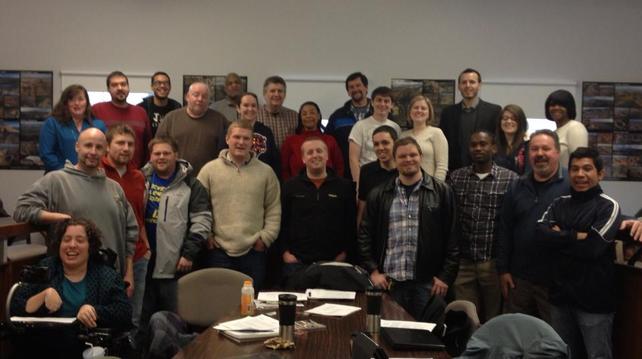|
|
 Since community is necessary for the study of Scripture, the sharing, the insight, the process incumbent on sorting through difficult texts, the hard work of exegesis and interpretation, teaching Bible in an online format presents a significant challenge. After a few years of resistance, owed to my purist approach and poor student evaluations I was referred to a course through the Wabash Institute on Teaching Online. While the course was not specifically designed for professors of Biblical Studies, I met more than a few who were as frustrated as I was with the prospect. Through the process, I learned some tips and tools and was able to adjust these for teaching my online Bible courses. What follows are a few things that have proved useful to me and my students, things I wish I had known in the beginning. I offer this with gratitude to my students who have offered helpful feedback and have been patient and receptive through change. 1. Group Study-Facilitating a sense of connection is important in any classroom but it is crucial for online students who are separated by distance and schedules and life stations. To help facilitate community, I assigned groups of 4-5 students each. These groups would then serve as a cohort, so that it would be within this group that students would share weekly postings and reflect together. 2. Group Work-As a student, I hated this myself, I wanted to be graded on my own merit but there is nothing that can bond you together like a common project. The first assignment in my course is an identification project where students must identify people, places and events from the Greco-Roman era. Each group is assigned 75 items and are allowed to divide the work as they wish, and they post this exercise in a Moodle activity called “Glossary.” 3. Distinction from Group- Though students post weekly within their group and work on the initial assignment as a group, each person is assigned a color. This makes grading easy as I am able to see how much “red” has added to the project and how little “blue” has contributed. Students know that they are graded only on their own work. 4. Weekly Interaction-One of the most difficult parts of teaching online, in my opinion was managing the many forums and responses to forums each week. I simply didn’t have time to go through them all and make meaningful comments or offer helpful feedback. As a result, students felt as though they had no interaction with their instructor. Since my university uses Moodle as our online platform, I decided to link to an outside wiki to create an easier format for weekly conversation. In my wiki I create a page for each group and each week upload a discussion question and a table where each student in the group is assigned a column and reminded of his/her assigned color. Students post in their color and column initially and also must reflect and engage with at least two other students in those students’ columns but in their own color. This is helpful in that I visit the wiki frequently each week, look at the pages, and all in one place I’m able to offer feedback in my color so that we have a common conversation. Additionally, students are able to keep the questions, insights and feedback from the course for their own use moving forward. 5.Coming Together- At the end of each unit I offer a synchronous online chat, so that there are three per semester. Students are required to attend at least one, but typically most students attend each session. This is an opportunity for us to gather at the same time and be online together so that we can share questions, comments and insights and feedback is immediate. 6. Content- In the online format content CAN NOT depend solely on the lecture. Since we are delivering the course through the web it is necessary to understand and use technology as a resource not a hindrance. This can be especially difficult if your students have varying technological skills and abilities. I recommend that a basic review of these skills and capabilities, (i.e., basic understanding of online media, web surfing, you tube video posting, email, online chat) be introduced and evaluated in the application process of the online program. Use video, reading and activities as your primary teaching tools and supplement with weekly video postings that are succinct and created for your online students. 7. Questions and Comments- There is nothing so frustrating as answering the same question thirty times or more which is what I did when online students contacted me via email. This year I added a “comment” block on my Moodle course home page and instructed students to post any and all questions that were suitable for the entire class. I explained this was the space where we “raise our hands” and ask questions or make comments for which all might find beneficial and asked them to send me messages through Moodle only for those questions that needed to be sent to me personally. I was able to check the Moodle home page regularly and respond in one place and keep students informed. I hope these changes I have made can be helpful for you too. Please feel free to share your ideas and insights here too!
0 Comments
Leave a Reply. |
Subscribe Today for Free GiftBLOG
Archives
June 2019
Categories
All
|

 RSS Feed
RSS Feed